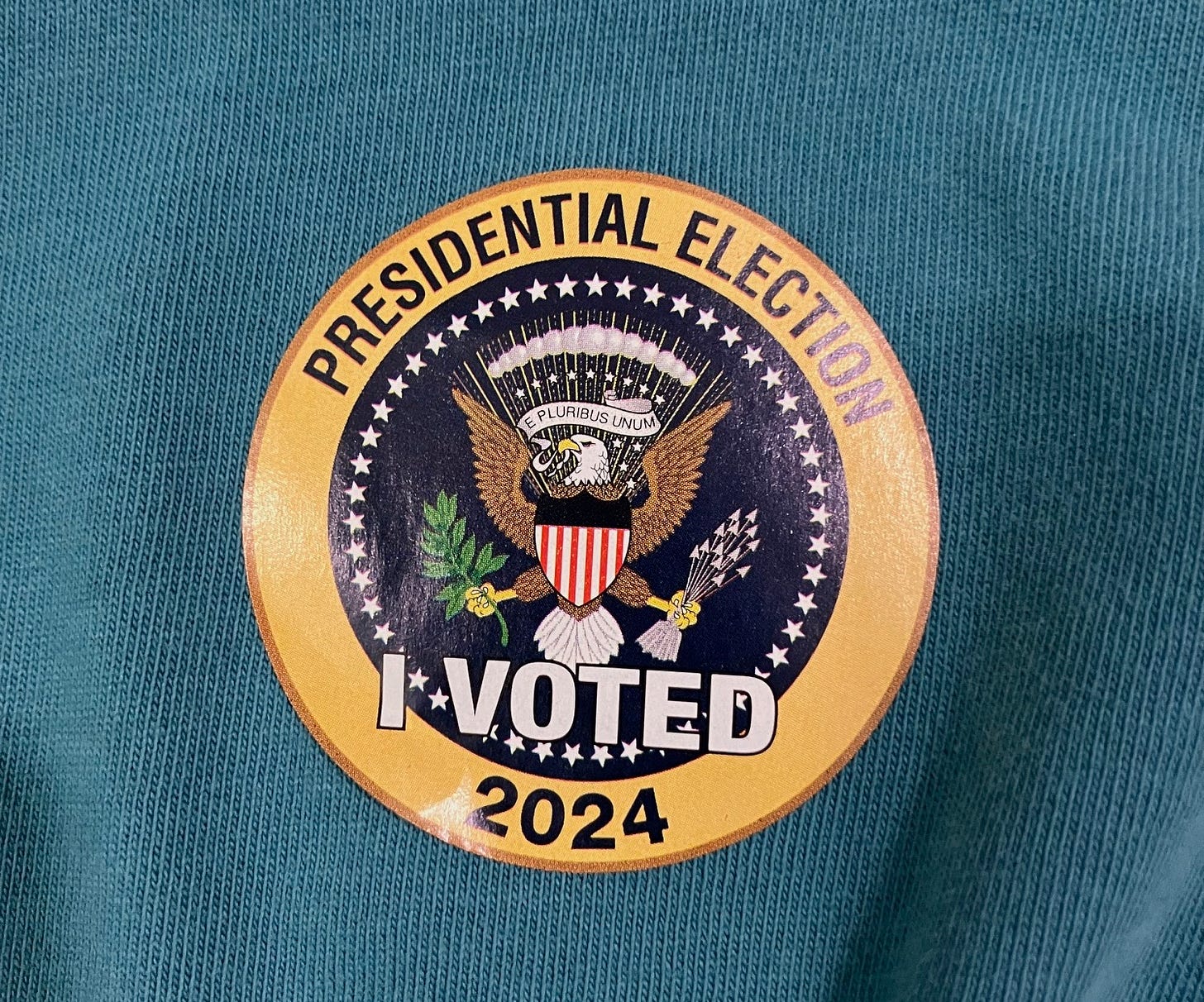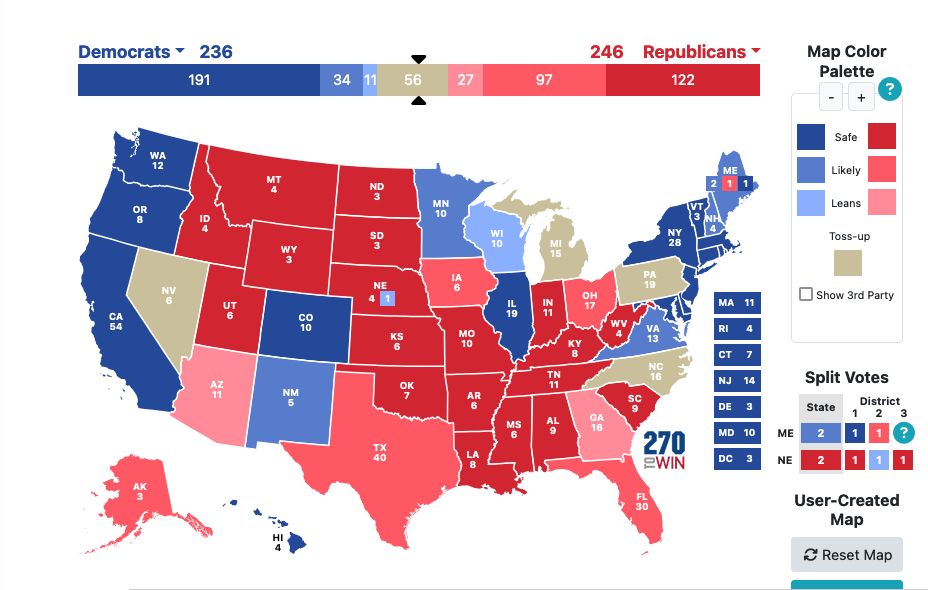What’s Next?
I hate Election Day. I don’t find a lot of silver linings in the louring clouds.
If Trump wins, I struggle to find anything positive to hope for. I theoretically support his notion of tariffs on imported goods. Economist mostly hate import tariffs since they raise the cost of consumer goods, but our high costs of living now is housing and food, not consumer goods, and historically import tariffs were part of the rise of most of the world’s great economies. That’s how the U.S., Japan, and Germany created their periods of prosperity, and I think tariffs could help the U.S. go through a brief “Indian Summer” of industrial job re-shoring before the next downward step in imperial decline. But I have trouble believing that 2024 Trump—who has added to his lifelong fecklessness a newfound senility—will accomplish any legislative goals. I’m grateful that in the early days of his first term Trump killed “free trade” but beyond that he was a bad president, and he openly says if he loses it can only be because of fraud requiring him to try to overthrow the election results again. It frustrates me that so many Trump supporters don’t care. Breaking a corrupt system just adds brokenness to the corruption.
If Kamala Harris wins, it will be nice for my daughter to grow up knowing that women can be presidents in reality and not just in theory. I also like the way she plainly and forcefully defends the need for abortion as a basic part of women’s healthcare. Conservative fantasies aside, the lady parts that make the babies are intrinsically connected to the rest of the lady parts, so that there is no way to have quality women’s healthcare unless medical professionals can abort fetuses without having to answer to the cops. Presidents can’t actually do much about this; the Supreme Court is already packed. It was always a cynical mistake for Democrat legislators to expect the courts to do their work for them, but having a president who speaks the truth on at least one issue would be a good thing.
Beyond that, as far as I can see, a Harris Administration just means more war, more pro-finance hooha, and more happy talk about how everything is great since everything is great for society’s winners. Maybe we need a few means-tested tax credits, but other than that what can a president do? I actually expect a retreat from Biden’s tepid anti-monopoly appointments regardless of who wins, even though breaking up monopolies would do far more for the economy than tariffs, banning immigration, and tax credits combined.
So I’ll take Harris over Biden, whom I think is mentally unfit to be president, and over Trump whom I also think is mentally unfit to be president, but there’s nothing to be celebrated about “Our Democracy” being “defended” by a candidate who didn’t even go through a primary process.
This century so far is a tragicomic cavalcade. Starting in 2000 we had a president, who was a son of another president, effectively appointed by the Supreme Court. Then the president started an unnecessary war that did immense damage to America and the Middle East. Then we had two terms of Obama, who—although a bad president in many ways—was better than what has come before or since. After Obama we had a race between a man who had never served in any political office and the wife of a former president. The winner pulled us out of a treaty that had been ratified by Congress, assassinated a diplomat from that country, incited a riot to attempt to disrupt the counting of the electoral votes that is part of the Constitution he took an oath to uphold, and tried to bait-and-switch fake sets of electors in various Republican states. After that we had a man who is 146 years old, cannot give a coherent speech, blocked peace efforts in an unwinnable war that will destroy Ukraine, and is giving unconditional support to one of the worst genocides since WWII. This last horror is probably the most indefensible policy decision in the history of the United States and will have terrible consequences for us for generations to come. It’s sickening that both Harris and Trump support this. In fact Trump says he hasn’t backed the genocide enough.
I remember reading histories like Gibbon’s Decline and Fall of the Roman Empire and wondering why they just didn’t get their acts together and appoint better emperors? Now I get a sense of how hard it can be.
Who will the next president be?
With those cheerful thoughts out of the way, tonight the voting booths will close and the television networks will begin calling states. At first these are not official counts by state governments, but projections based on interviewing voters as they leave polling stations. Many states will be easy to call if these “exit polls” match polling before the elections.
Then after the polls close around 9pm the states themselves will announce official counts. That could go on all night and for days afterwards. Once a few official counts are reported pollsters can begin to predict the unreported states. Remember the issue is how to extrapolate entire states from small survey samples. We’re not waiting for Americans to make decisions; we’re waiting to find out what in most cases they decided weeks or months ago.
Have Trump voters been undercounted as they were in 2016 and 2020? Pollsters say they have corrected their models. But what if that means this time they’ve over-counted?
Have pro-choice female voters been undercounted as they were in the 2022 midterms? (This was a reaction to the Dobb’s decision.)
How have the campaigns’ GOTV efforts fared? (“Get out the vote”)
North Carolina is a “swing state” that is expected to count its votes early. Trump is a bit favored, but how much he wins by will give insight into how much the models are off and in which direction. If Trump wins by a large margin, that means he will probably go on to win the election. If he barely wins, Harris still has a decent shot at the general election. If Harris wins by a large margin, she will probably go on to win the election.
The states that should be easy to call are below. These are the non-swing states. If any of them turn out differently than these projections it means the models are wrong in that direction everywhere. For example, I’m included Georgia and Arizona as Republican and Wisconsin as Democratic, even though these are often listed as “swing states,” because if Trump loses Georgia or Arizona, or if Harris loses Wisconsin, that means the models have been wrong in one direction or the other and that shifts elections everywhere.
Michigan might not be settled till Wednesday morning. If North Carolina goes for Trump, Harris must win Michigan, and based on polling in the state’s large Muslim community, she might not be able to, due to her support of Israel this year.
Pennsylvania will be a mess of slow counting and legal challenges. Harris probably needs to win it to win the election.
Nevada will probably go Harris. In fact I should have probably listed it, like Wisconsin, as a must-win state. But it’s only 6 electoral votes so it won’t likely sway the election.
Why It’s So Close
We’re living in an age of mediocre politicians. The reason I keep pounding home the point that we’re not waiting for Americans to think; we’re waiting to find out what they thought all along is because more skillful politicians would have done this years ago.
Campaigns don’t have to be run on, Joel Jones is a great guy; he did such-and-so when he was young, he believes in such-and-so, and he will listen to/stand up for/defend you. But all the national and local ads that I see are about the politicians and how great they are; it’s like press releases for pop stars. Great politicians show you that they already have listened by telling a story of your needs, your situation, what you want. They run on what you want.
I remember my grandmother late in life on the rare occasion when we discussed politics. She had been a ‘liberal republican’ all her life I think, a businessman’s wife who threw parties and smoked cigarettes and disliked FDR and the New Deal as a matter of class pride, but I asked her near the end about FDR, and she smiled like she smiled at everything and said he was what the country needed. Then she inhaled her cigarette through her painted-on lips and said he probably saved the country.
It’s rare to have a counter-factual opportunity to test such notions, but if you’ve ever wondered what would have happened if there hadn’t been a New Deal, we can compare FDR’s response to the Great Depression with Obama’s response to the Great Recession. I’m not saying Obama could have given us a New Deal if he had wanted to. The timing of their elections relative to the different economic downturns, the make-up of their respective parties, the behavior of their opponents—these were different. I’m saying that Obama didn’t give us a New Deal. He did not create widespread programs. He did not describe the poverty in a important way. He did not change the power dynamics between rich and poor or management and labor. He did not hire artists to go out and create a picture of the country and its people. He patched up the system and put it back on its feet, rather than reforming it.
Two decades later we’re seeing how a lack of a New Deal during a catastrophic economic downturn plays out. As events in the Middle East are the natural repercussion of Bush’s Iraq War, events at home are the natural repercussion of Washington’s weak response to the Great Recession.
I do think it matters that we recognize that the system isn’t good and isn’t in our self-interest. Recognizing that alone is humanizing. There’s a wonderful improv mantra: Who can keep me from listening? No one. In that light who can keep us from witnessing and understanding the times we’re living in? Who can keep us from sharing, caring, grieving, hoping, and being disappointed?
No one.
Thanks so much for reading!
Next week I want to go back in time to the last time the world warmed!
Please subscribe and share!
Comments are welcome but please no personal insults or profanity!





